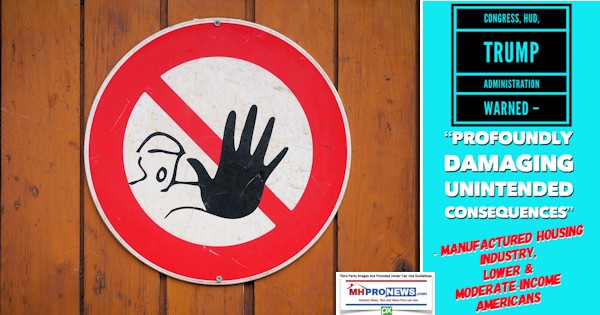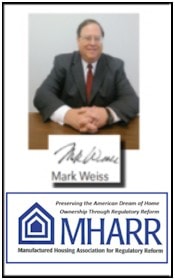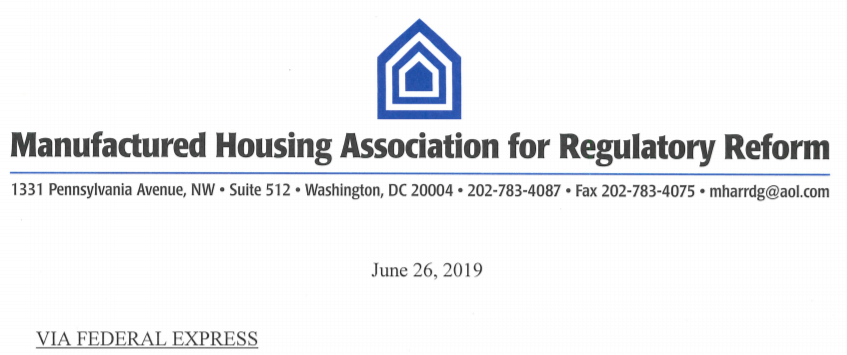
- “While we believe that this bill is well intended and that HUD Code manufactured housing is a key part of the solution to the nation’s affordable housing crisis…”
- “…we also believe that the legislative provisions needed to advance the availability and affordability of manufactured housing are already contained in the existing federal manufactured housing law.”
- “By contrast, we believe that H.R. 926 is not only unnecessary, but could have profoundly damaging unintended consequences for both the mainstream HUD Code manufactured housing industry and the lower and moderate-income American families who rely on those mainstream manufactured homes as the nation’s premier source of affordable, non-subsidized homeownership.”
The bulleted pull-quotes above are from a recent letter to elected and appointed leaders in Washington, D.C. dated June 26, 2019.
In separate letters to the leadership of the House Financial Services Committee, the Senate Committee on Banking, Housing and Urban Affairs, copied to 
The letters are essentially identical, save the Senate version of the MHARR letter cites their bill number as S. 1804. The House version of the MHARR letter cited their pending proposal as H.R. 926.
The Daily Business News on MHProNews will do some additional analysis following the House version of the MHARR letter, from Mark Weiss, J.D., President and CEO, that follows.

| Hon. Maxine Waters | Hon. Patrick McHenry |
| Chairman | Ranking Member |
| House Financial Services Committee | House Financial Services Committee |
| Suite 2129 | Suite 2129 |
| Rayburn House Office Building | Rayburn House Office Building |
| Independence Ave. and S. Capitol St., S.W.
Washington, D.C. 20515 |
Independence Ave and S. Capitol St., S.W. |
|
|
Washington, D.C. 20515 |
Dear Chairman Waters and Ranking Member McHenry:
The Manufactured Housing Association for Regulatory Reform (MHARR) is a Washington, D.C.-based national trade organization representing the views and interests of independent producers of manufactured housing regulated by the U.S. Department of Housing and Urban Development (HUD) pursuant to the National Manufactured Housing Construction and Safety Standards Act of 1974 as amended by the Manufactured Housing Improvement Act of 2000. (42 U.S.C. 5401, seq.). MHARR’s members are primarily smaller businesses located throughout the United States.
We are writing to apprise you of our serious concerns with — and opposition to — a bill currently pending before your committee, entitled “The HUD Manufactured Housing Modernization Act of 2019” (H.R. 926).
While we believe that this bill is well intended and that HUD Code manufactured housing is a key part of the solution to the nation’s affordable housing crisis, we also believe that the legislative provisions needed to advance the availability and affordability of manufactured housing are already contained in the existing federal manufactured housing law. By contrast, we believe that H.R. 926 is not only unnecessary, but could have profoundly damaging unintended consequences for both the mainstream HUD Code manufactured housing industry and the lower and moderate-income American families who rely on those mainstream manufactured homes as the nation’s premier source of affordable, non-subsidized homeownership. Indeed, if enacted into law, this bill could ultimately undermine all of the gains, advancements, recognition and acceptance that the industry (and consumers) have achieved under the Manufactured Housing Improvement Act of 2000 and the reforms within that law designed to transition manufactured homes from the “trailers” of yesteryear to modern, legitimate “housing” for all purposes.
Specifically, this bill in light of recent developments concerning the Duty to Serve Underserved Markets (DTS) provision of the Housing and Economic Recovery Act of 2008 (HERA) and the apparent effort by Fannie Mae and Freddie Mac, promoted by some in the industry, to divert DTS support to a supposed “new class” of pseudo-manufactured homes while providing no support whatsoever to existing, mainstream manufactured homes financed through personal property loans (which comprise 80% of the HUD Code manufactured housing market) – appears to be tailored not only to legitimize the so-called “new class” of pseudo-manufactured home, but also to mandate government support for the utilization of that “new class” of home. The legislation, consequently, if enacted, would legally validate the discriminatory DTS policies adopted by Fannie Mae and Freddie Mac and the establishment of two separate “classes” of “residential manufactured homes” the new class of high-cost, site-built-like hybrid homes favored and prioritized for securitization and secondary market support by Fannie Mae and Freddie Mac on the one hand, and a “second class” comprised of existing, affordable, mainstream HUD Code manufactured homes on the other, with continued and worsening discrimination against the “second-class” of mainstream HUD Code manufactured homes.
The legislation would thus sanitize and institutionalize the diversion of DTS support from mainstream manufactured housing to this so-called “new class” of home. It would also pave the way for local jurisdictions to utilize this “new class” of home — while in many, if not most cases, continuing to exclude and discriminate against mainstream, affordable HUD Code manufactured housing in order to access HUD grants and other funding. The bill does this through a two-step process of altering the definition of “manufactured home” currently contained in federal law and then requiring the inclusion of homes meeting this altered definition in the “Consolidated Plans” that jurisdictions must submit to HUD in order to receive federal funding under multiple HUD programs.
In relevant part, the bill directs HUD to “issue guidelines for jurisdictions relating to the appropriate inclusion of residential manufactured homes in a Consolidated Plan of the jurisdiction.” (Emphasis added). The definition of “residential manufactured home” contained in the bill, in turn, while referring to the definition of “manufactured home” contained in the National Manufactured Housing Construction and Safety Standards Act of 1974, as amended by the Manufactured Housing Improvement Act of 2000, would nevertheless alter that definition by using the term “residential,” which is not contained or included in the existing federal law definition. The bill, accordingly, would create a discrepancy between the existing definition of “manufactured home” and what does — or does not — constitute a “residential manufactured home,” potentially without any type of vetting, analysis or due consideration, that would elevate the so-called “new class” of home for use in every jurisdiction receiving HUD grants and other funding, while reducing mainstream, affordable HUD Code manufactured homes, once again, to second-class “trailer” status contrary to the 2000 reform law.
The bill, accordingly, poses a significant threat to existing, affordable, mainstream HUD Code manufactured housing and the lower and moderate-income families that rely upon those homes. At a minimum, with its altered definition of “residential manufactured home,” which is materially different from the definition already contained in federal manufactured housing law, the bill, if enacted, would create immediate market confusion — particularly for existing HUD Code manufactured homes, homeowners, and purchasers that could further suppress the mainstream, affordable HUD Code market and could lead to legal liability and litigation over just what does or does not constitute a “manufactured home” for purposes of federal regulation and a multitude of other issues.
Specifically, the bill is unnecessary and potentially harmful, in that it:
- Would perpetuate a negative connotation and image of existing, mainstream, HUD Code manufactured housing through its title, which implies that manufactured homes are in need of “modernization” notwithstanding the sweeping institutional reforms of the Manufactured Housing Improvement Act of 2000. In addition, the title is misleading and inaccurate, in that the HUD program and the legal treatment of manufactured housing itself were already “modernized” by the 2000 reform law, after input from all stakeholders and the National Commission on Manufactured Housing. Consequently, if this bill is advanced in any form, its title should be changed to the “Manufactured Housing Parity and Equality Act of [Insert] ;”
- Would, by changing the definition of what constitutes a “manufactured home,” create a substantial risk that the so-called “new class” of manufactured homes could lead to the establishment of a new baseline for all federal manufactured home standards, which would destroy the fundamental affordability of manufactured homes;
Would even if it does not lead to more expansive and costly federal standards, as above re-relegate existing, mainstream, affordable HUD Code manufactured homes to second class “trailer” status;
- Would undermine gains and advances made through and as a result of the Manufactured Housing Improvement Act of 2000 to elevate the status of mainstream, affordable manufactured homes to that of legitimate “housing” for purposes (including federal and federally-sponsored housing programs);
- Would legitimize and institutionalize continuing discrimination against mainstream, HUD Code manufactured home personal property loans under DTS;
- Would legitimize and reinforce the discriminatory exclusion of mainstream, affordable HUD Code manufactured homes in jurisdictions seeking HIJD grants and other related funding by effectively directing those jurisdictions instead to higher-cost, “new class,” hybrid-type homes;
- Would direct HUD funding and grants to jurisdictions that continue to discriminate against and exclude mainstream, affordable HUD Code manufactured homes and manufactured housing residents;
- Would create immediate market confusion, would further suppress the existing HUD Code manufactured housing market and depreciate the re-sale value of such mainstream, affordable manufactured homes;
- Would benefit just a handful of industry conglomerates at the expense of smaller, independent industry businesses and the lower and moderate-income American homebuyers who rely on the affordability of mainstream HUD Code manufactured housing.
Consequently, rather than this bill, with its inconsistent language and potentially devastating consequences for mainstream, affordable HUD Code manufactured housing, MHARR instead supports language that could be included in any moving bill involving HUD or housing finance that would ensure equal, non-discriminatory treatment for all HUD Code manufactured housing in both HUD housing and community grant programs, and housing finance programs under the jurisdiction of HUD (i.e., the Federal Housing Administration and Ginnie Mae) and/or the Federal Housing Finance Agency (i.e:, Fannie Mae and Freddie Mac). It is worth noting that under the 2000 reform law, manufactured housing producers have — and have always — been capable of building homes with additional upgrades and features. Thus, the MHARR-suggested language below:
- “The Secretary of Housing and Urban Development shall provide for the inclusion of manufactured homes in all housing, federal housing assistance and community development programs and activities, including community development grants, administered by the Department, and shall ensure that any jurisdiction participating in any such program or applying to participate in any such program does not exclude or unreasonably restrict the placement of manufactured homes as defined by and regulated pursuant to the National Manufactured Housing Construction and Safety Standards Act of 1974, as amended by the Manufactured Housing Improvement Act of 2000 (42 U.S.C.
5401, et seq.) within that jurisdiction.”
‘The Federal Housing Finance Agency shall ensure that the Government Sponsored Enterprises provide securitization and secondary market support for loans to purchase manufactured homes regulated pursuant to the National Manufactured Housing Construction and Safety Standards Act of 1974, as amended by the Manufactured Housing Improvement Act of 2000 (42 U.S.C. 5401, et seq.), including loans secured by manufactured homes titled as real estate and manufactured homes titled as personal property, on an equal basis with all other types of single-family homes.”
Such language, attached to any moving bill in Congress, would propel parity and equality between existing, mainstream, affordable HUD Code manufactured housing and all other types of housing, while simultaneously prohibiting discrimination against HUD Code housing (and manufactured homeowners) in vital areas. By contrast, when the innocuous veneer of the pending bill is stripped away, it becomes apparent that it would do serious harm to existing, mainstream HUD Code manufactured housing and the lower and moderate-income American families who rely on the non-subsidized affordability of those homes.
Consequently, while MHARR recognizes and appreciates the positive intent underlying this bill, it does not and cannot support H.R. 926 and urges your committee to take no further action to advance it. If, however, further action is taken on this bill, we respectfully urge your committee to hold a full hearing on the highly-damaging potential consequences of such legislation on mainstream, affordable manufactured housing, and would ask that MHARR be provided an opportunity to offer the above proposed language that would actually advance your positive intentions without harming the HUD Code manufactured housing industry as it exists today.
Thank you
Sincerely,
Mark Weiss
President and CEO
cc: Hon. Norma Torres
Hon. Ben Carson
Hon. Mick Mulvaney
Hon. Mark Calabria
HUD Code Manufactured Housing Industry Members
###
In conversations between MHProNews’ publisher L. A. ‘Tony’ Kovach and key legislative staff from both political parties, Kovach noted that starting with the title of the bill, the measure is problematic. He said that “The HUD Manufactured Housing Modernization Act of 2019” makes it sound like HUD Code manufactured homes needs to be ‘modernized,’ thus sending the wrong message to the millions who might here about the bill but never get beyond a headline.
Tony Kovach did not go into the same points that MHARR did, as his contacts with Congress relative to this measure were prior to the MHARR letter. But he did note similar concerns, namely, that what is needed is enforcing existing laws, not passing a new one that might in fact undermine the enhanced preemption portion of the Manufactured Housing Improvement Act (MHIA) of 2000.
Rephrased, MHARR and MHProNews’ leadership came to similar concerns and conclusions apart from each other about this bill. GovTrack gives it only single digit odds of passage. But even the discussion of the measure – due to the name of the bill – can prove damaging.
Our prior report on this is linked below and is very relative in the light of the more recent MHARR comments.
It should be noted that MHProNews was a leader in sounding the alarm about the new class of homes promoted by Clayton Homes and their association mouthpiece, Arlington, VA based MHI.
We said at that time that it could prove to be a Trojan horse for the industry and warned that it could undermine the sales and acceptance of all other types of manufactured homes. That warning has been repeated several times, such as when the Government Sponsored Enterprises (GSEs) of Fannie Mae and Freddie Mac rolled out their programs, which made distinctions between the ‘new class’ of homes and all other manufactured homes.
The ‘new class of homes,’ related issues, and this new measure are examples of how the good news about manufactured homes can be and has been obscured. That has often been done by those who claim to be promoting the industry.
That the promotion of operations owned by Berkshire Hathaway, such as Clayton Homes, or MHI and some ‘big boy’ members there has not been successful is self-evident, based upon the latest shipment data and recent new manufactured home sales trends. See that report, linked below.
Manufactured Housing Production and Shipments, Official HUD Data, Report for May 2019
That it need not be so is exemplified by companies that are growing, while others that are shrinking in sales. A publicly traded example is spotlighted in the report linked below.
Nobility Homes Bucks National Trends, Reported Serious Growth, plus Manufactured Home Stock Updates
“We Provide, You Decide.” © (News, analysis, and commentary.)

(Related Reports are further below. Third-party images and content are provided under fair use guidelines.)

1) Marketing, Web, Video, Consulting, Recruiting and Training Resources
Soheyla Kovach, managing member, for LifeStyle Factory Homes, LLC – parent to Daily Business News on MHProNews and MHLivingNews.com
Related Reports: You can click on the image/text boxes to learn more about that topic.
MHARR Cautions Congress on Two Unnecessary And Damaging Manufactured Home Bills | Manufactured Housing Association Regulatory Reform
Washington, D.C., July 1, 2019 – The Manufactured Housing Association for Regulatory Reform (MHARR) in a June 26, 2019 communication to both houses of Congress (copies attached), has called on legislators to take no action on pending proposed bills that are at best unnecessary and, at worst, harmful and damaging to both the mainstream HUD Code manufactured housing industry and the lower and moderate-income American families that rely on those homes for affordable homeownership.
Tic Toc – July 4th, Tim Williams 21st Mortgage, John Greiner, JD, Graydon Law – Message Review
White House Announces Council on Eliminating Regulatory Barriers To Affordable Housing | Manufactured Housing Association Regulatory Reform
MHARR participated in a conference call on June 25, 2019, conducted by the U.S. Department of Housing and Urban Development (HUD), during which White House officials announced the impending issuance of an Executive Order (EO) to create a “White House Council on Eliminating Regulatory Barriers to Affordable Housing.”
The Masthead
Millions of Americans were taught or acquired a sanitized or weaponized view of American history. Even those of us who focused on history in high school and at university were to varying degrees tainted by the perspective of instructors, pop culture, or textbooks.

























